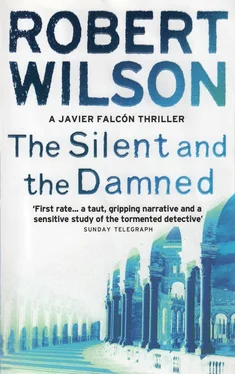At midday Falcón crossed the road, let himself in to Pablo Ortega's garden and opened up the house. He turned on the air conditioning, shut the door to the room where Pablo had died and jammed a damp towel at its base in an attempt to reduce the terrible stink. He checked the fridge for beer.
Ignacio arrived and knocked at the sliding doors. They shook hands. He looked younger than Pablo, but not by much. He was bald but hadn't made the drastic error of trying to plaster his still dark hair from one side over to the other, although the idea had possibly occurred to him. He was slimmer and fitter than his brother but had no presence whatsoever. This was a man who would disappear in a room and Falcón understood why he'd asked his brother to come to his business functions. He badly needed to borrow some charisma.
Ortega apologized for ruining his Sunday but he'd felt a need to see the place where his brother had died. Falcón said he was going to be busy the following day and mentioned the identification of the body and where that would take place. They agreed a time. Falcón offered him a drink and they opened up a litre bottle of Cruzcampo from the fridge. The beer seemed to make Ignacio emotional. He had to wipe away tears and stare at the floor.
'You were close,' said Falcón.
'He was my only brother,' said Ignacio, 'but I didn't see much of him. He was a famous man travelling the world, while I sold and installed air-conditioning systems. Our paths didn't cross that often.'
'You must have seen him more often since Sebastián's trial. He hasn't been working so much and there's been this problem with the house.'
'That's true,' said Ortega, pulling out a pack of Ducados and lighting one. 'He'd been going through a rough time, but… I tried to help him with this problem. I sent someone round the other day. I can't believe… it just seems so strange that he's not here.'
'I went to see Sebastián in prison yesterday,' said Falcón.
Ignacio looked up with watery eyes as if he was going to get more information.
'That was a difficult relationship,' he said. 'Father and son.'
'Any reason for that?'
'Our own father… he was a very difficult man.'
'In what way?'
'He'd had a hard life,' said Ignacio. 'We don't know what happened to him exactly. There was nobody left to tell us except him, and he never talked about anything. Our mother only told us that his village was caught up in the Nationalist advance during the Civil War and that the Moors did terrible things to people. As far as Pablo and I were concerned the worst thing they did was to let him survive.'
'Pablo was the eldest?'
'Our parents married the year the war ended and Pablo was born the year after that.'
'And you?'
'I was born in 1944,' he said.
'Those were hard times in this part of the country.'
'We had nothing… like everybody else had nothing. So it was hard, but nobody was alone in their poverty. That wouldn't explain why our father was so brutal with us. Pablo always bore the brunt of it. He said that it was those years dealing with our father that made him into an actor. It wasn't a great childhood. Pablo said it was why he never wanted kids.'
'But he did,' said Falcón. 'And you?'
'I've got two… they're grown up now,' he said.
'Do they live in Seville?'
'My daughter is married and lives in California. My son… my son is still here.'
'Does he work with you?'
'No,' said Ignacio, his mouth snapping shut, dismissing the notion.
'What does he do?' asked Falcón, more to be polite than to intrude.
'He buys and sells things… I'm not really sure what.'
'You mean you don't see so much of him?'
'He has his own life, his own friends. I think I represent something that he wants to rebel against… respectability or… I don't know.'
'So what about Pablo's relationship with Sebastián? Was that coloured by the fact that he didn't want children in the first place?'
'Is there a problem here?' asked Ignacio, squinting up from his glass of beer.
'A problem?' said Falcón.
'All these questions… very personal family questions,' said Ignacio. 'Is there some doubt about what happened here?'
'Not what, but why it happened,' said Falcón. 'We're interested in what triggered your brother's suicide. It might have a bearing on another case.'
'Which case is that?'
'His next-door neighbour's.'
'I heard about that. There was a piece about it in the Diario de Sevilla.'
'You knew him, of course.'
'I… I did know him,' said Ignacio, faltering as if this was not something he immediately wanted to admit. 'And I read there was some doubt about what had happened in his case… but I don't really see how Pablo's death could possibly be linked.'
'Pablo knew him as well… through you.'
'Yes, that's right, Pablo would occasionally come with me to functions in the years when I was trying to get the business off the ground,' said Ortega. 'So why do you think Pablo's suicide was connected to Rafael and Lucia Vega's death?'
'I'm looking at it more from the point of view of strange coincidence at this stage,' said Falcón. 'Three people dead within days of each other in a small barrio like this. That's odd. Did one trigger the other? What were the pressures on Pablo in the lead up to his death'
'For a start, I can tell you that Pablo couldn't kill a chicken. It was one of our father's abuses that he used to force him to do it.'
'Rafael Vega drank, or was forced to drink, a bottle of acid.'
'Pablo was a completely non-violent person,' said Ignacio.
'So what do you think could have triggered your brother's fatal decision?'
'There must have been a letter, surely?' said Ignacio.
'The way it happened was that he and I arranged to meet here yesterday morning. He wanted me, as a professional, to find the body. There was a letter to me explaining that, and a short note to Sebastián.'
'But nothing written to me?' said Ignacio, puzzled. 'What did he write to Sebastián?'
'He said he was sorry and asked for his forgiveness,' said Falcón. 'Do you know why he should write something like that?'
Ignacio coughed against some involuntary sobbing. He pressed the beer glass to his forehead as if trying to cram it into his brain. He broke out of it and hung his head, staring at the floor, as if he was thinking of something plausible to say.
'He was probably sorry that he hadn't been able to show his son enough love,' said Ignacio. 'It's all tied up with our father. I think the same happened between me and my son. I failed him, too. Pablo used to say that damage was passed from generation to generation and it was difficult to break the cycle.'
'Pablo had theories about this, did he?'
'Because he read all these books and plays he had intellectual ideas about it. He said that it was an atavistic trait of fathers to make themselves unknowable to their sons in order to retain power in the family or tribe. Showing love weakened that position, so men's instincts were for aggression.'
'Interesting,' said Falcón. 'But it avoids the issue, which is much more personal. Suicide is a personal matter, too, and most of the time in my job it doesn't matter why it happened, but in this case I want to find out.'
'So do I,' said Ignacio. 'We all feel blame when something like this happens.'
'That's why my questions have to be personal,' said Falcón. 'What can you tell me about Pablo's relationship with his wife – Sebastián's mother? He wasn't married before, was he?'
'No, Gloria was his only wife.'
'When did they marry?'
'In 1975.'
'He was thirty-five.'
'I told him he was leaving it too late,' said Ignacio. 'But he had a career, there were actresses, it was a lifestyle.'
'There were lots of girlfriends before Gloria, then?'
Читать дальше
Конец ознакомительного отрывка
Купить книгу












